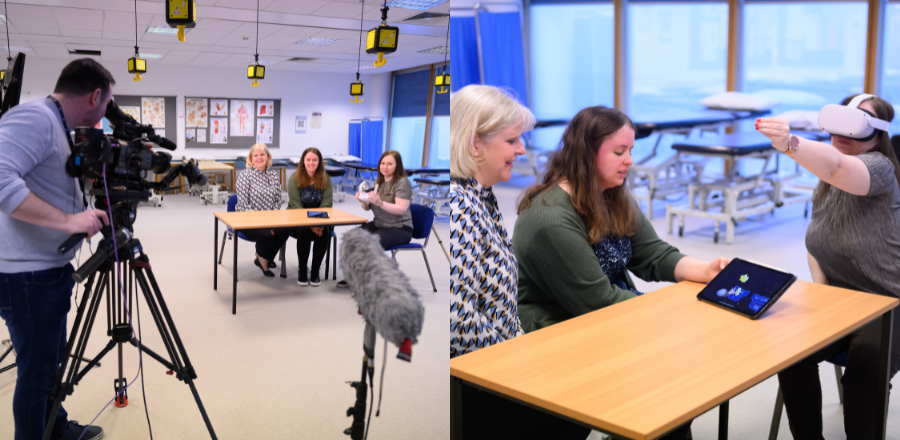Glasgow Caledonian develops new VR games to help improve the lives of people with MS

Virtual reality (VR) rehabilitation games have been developed by researchers at Glasgow Caledonian University to improve the lives of people with Multiple Sclerosis (MS) across Scotland.
Dr Amy Webster, supported by Professor Lorna Paul, in the School of Health and Life Sciences, has been collaborating with Dr Matt Poyade, from the Glasgow School of Art, and Dr Niall McDougall, from NHS Lanarkshire, to create the new games.
Dr Webster was funded by the MS Society through a PhD studentship to investigate how suitable these VR games are for rehabilitation and how helpful they are to people with MS who find it difficult to use their arms and hands.
The team have been working with a number of participants to test the VR games and get feedback from people who live with the condition. People taking part use headsets to enter these virtual realities where scenes and objects appear to be real. For example, making it look like you’re floating in space.
The games Dr Webster and partners developed for the study include playing a virtual piano, whack-a-mole and catch-a-falling-star. They’re designed to be fun and engaging. Amy hopes this will help with motivation and one participant, Lauren Forrester, described the project as a “game-changer”.
Lauren, 39, from Lanarkshire, was so delighted with the VR games and how they were helping her to improve her upper limb movement that she agreed to shout it from the rooftops on STV’s flagship Scotland Tonight programme. Watch here - https://player.stv.tv/episode/4q8m/scotland-tonight.
Glasgow Caledonian’s MS research featured in a special report on the programme entitled ‘Hope in the Battle Against MS’, which included interviews with Professor of Allied Health Science Lorna Paul, Dr Webster and Lauren. They were also featured on STV News - https://news.stv.tv/east-central/scottish-researchers-using-zebrafish-to-reverse-damage-caused-by-multiple-sclerosis.
Lauren said: “Rehabilitation has been so important to me, but there is no avoiding the fact that it gets tedious. The work that Amy has put into her games is a game-changer in this respect.
“I can't overstate how valuable I found it, being able to disconnect from the idea of rehab and just enjoy something light-hearted instead! The games are excellent for this! The focus becomes having fun, and who doesn't love the challenge of trying to beat a high score? Meanwhile, there's the added bonus of physical benefits that are useful every day.”
Dr Webster said: "I developed these virtual reality games using direct input from people with MS, for the purpose of improving their upper limb function. We’ve had really good results and feedback so far, such as seeing the advantages compared to traditional physiotherapy and enjoying the distraction virtual reality can provide. People with MS have also reported that they found some benefits from taking part in terms of their mobility and increasing exercise, which is really encouraging! Working with Lauren and other people living with MS was so rewarding and insightful.”
MS is a condition that can affect the brain and spinal cord, causing a wide range of potential symptoms, including problems with vision, arm or leg movement, fatigue or balance.
Scotland has the highest rates of MS in the world with more than 15,000 people living with the condition and the University has been at the forefront of ground-breaking research into the disease for years.
Professor Paul, who leads the Centre, said: “We really appreciate the funding from the MS Society who funded Amy’s research on VR for upper limb rehabilitation for people affected by MS and for Dr Matt Poyade and Glasgow School of Art and Dr Niall McDougall at NHS Lanarkshire for collaborating on this work with us.
“Amy’s research is being taken forward by one of the eight PhD students in our MS Doctoral Training Centre for symptom management where we are investigating exercise for people moderately affected by MS and in particular novel ways to encourage people to exercise, like VR. We are so grateful for Lauren and all the people affected by MS who support and take part in our studies – they are an amazing, inspirational group of people!”
